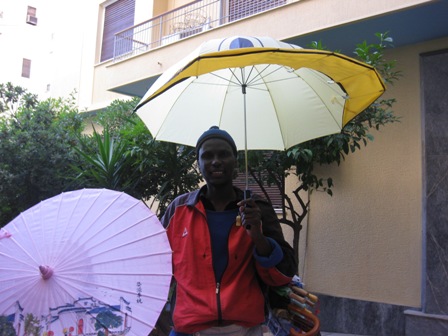Civil Society and the three Cultural Platforms

Sun umbrellas for sale in Athens
Purpose of the three Platforms
In addition to the working groups established by the European Agenda for Culture, where government players discuss their roles and responsibilities in matters of cultural policy, there are also so-called European platforms of civil society. They were created early 2008 to bring together European NGOs and networks to address the same cultural policy issues as the member states but from a position which takes civil society into consideration.
The three platforms are:
1. Intercultural Europe
2. Access to culture
3. Creative and cultural industry
About their set up and functioning a first critical evaluation has been made by Rolf Witte, International Relations Officer of the German Federation for Cultural Youth Education, BKJ in a special edition published by the German UNESCO division on the subject matter of: "Today's arts education":
"Once the Agenda was adopted, these platforms were immediately established by the European Commission to demonstrate democratic legitimisation, involvement of civil society expertise and transparency. Many of those representing civil society had been dissatisfied with the strict top-down process that had failed to involve many organisations and associations."
Source: Arts education for all: “What experts in Germany are saying”
(The English version of the magazine is available at http://www.unesco.de/fileadmin/medien/Dokumente/Kultur/Kulturelle_Bildung/_FINAL_Unesco_today_1_2010.pdf)
The remarks by Rolf Witte high light an overall situation at European level. For instance, Jürgen Habermas in his book "Ach, Europe", repeatedly criticizes the democratic deficit. Most of the European deliberation processes about policy have become an one-sided, top-down approach. Most of the issues are identified and analysed within such a neutral context that no outsider can really understand the language of not so much experts as insiders to the European process of deliberation. It becomes an all inclusive process once only key players set the stage for a dialogue with the Commission and seek merely to enhance their power measured in terms of being recognized by the Commission.
Already at the meeting of the platform "access to culture" in June 2009, the reports distelled out of the various contributions were criticized for being so lame. As if the spice has been taken out of the previous examples, the general description designed to be more acceptable to the European Commission can mean in effect real differences, unresolved conflicts and badly defined problems are simply overlooked. Practically people and members of these platforms are not involved as the forms of coordination of these platforms leave out most, if not all members. Instead the cultural platforms are run effectively by their respective general secretaries and staff along with the members of the steering committee, and this in liaison with Action Culture Europe having Ilona Kisch as its prime coordinator. This is done in collaboration with Isabelle Schwartz as representative of the European Foundation of Culture situated in Amsterdam, Holland. The latter has an independent source of funding possibilities and gains influence through that way by supporting these initiatives. Both Action Culture Europe and the platform for Intercultural Europe have received such a financial support, the latter in the form of a loan to bridge the time lag in the flow of payments.
Basically the first meeting to set up such a platform and thereby enhance the lobbying capacity of the cultural sector vis a vis the European Commission took place in 2006 under the chairmanship of Ilona Kisch. For the report of this meeting see:http://www.intercultural-europe.org/docs/report-first-meeting.pdf
Then came the year 2008 which was designated to 'intercultural dialogue' and during this time the set-up of the platforms was realised. They are thought of as an extension of the European Commission seeking further legitimization for its proposals to the Member States by staying through these platforms in contact with civil society.
It should be added the thesis by Alexander Mitscherlich about why people do not participate as much in culture as hoped for by policy makers. In his studies of post-war Germany he explained this by a lack of trust. There is culture available i.e. accessible, but people do not make necessarily use of it. If this holds still today, then participation in cultural events as offered, for example, by European Capitals of Culture programs does not satisfy this need to create more trustworthy communication structures which can guarantee in a much more substantial way that people not merely participate but contribute substantially themselves by becoming creative as envisioned all along by Beuys. Creative solutions are expressed best by cultural articulations which fulfil aesthetical criteria and thereby can give testimony to cities and societies very much alive, indeed exhurberant about the chances offered to do interesting and meaningful things. That should hold equally for the three platforms if they wish to dip into the experiences made in praxis by artists and people going together to form new self-understandings at various cultural levels.
« Studies about Intercultural Dialogue | Report of the 3 Cultural Platform meetings in June 2009 »
